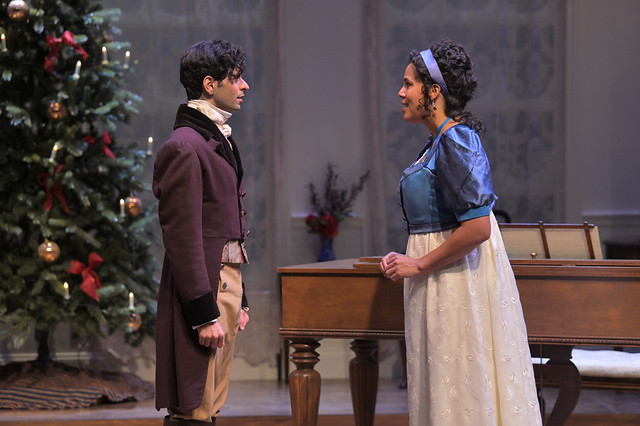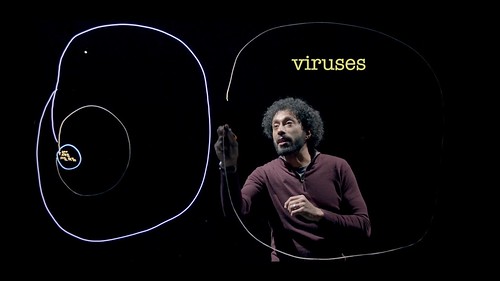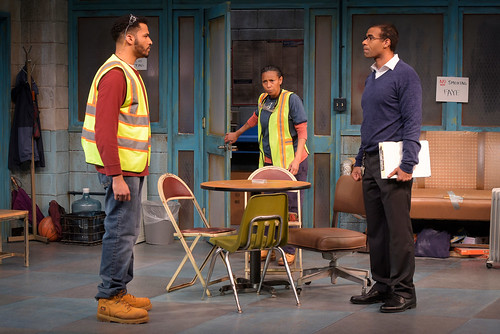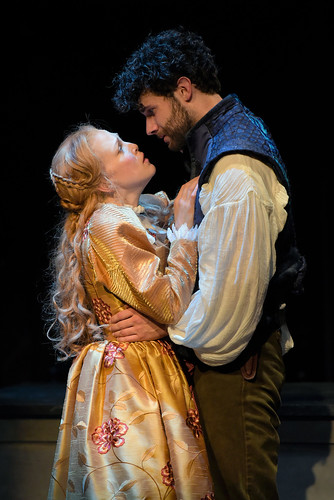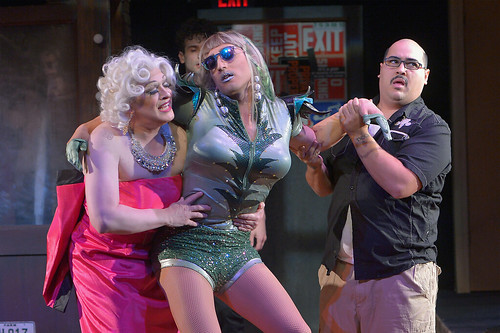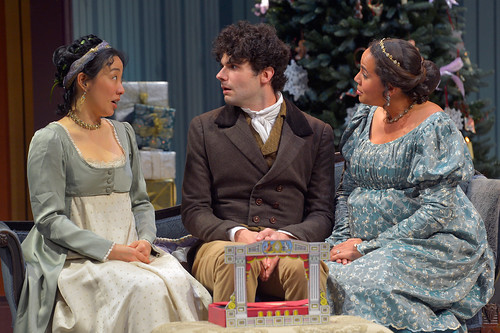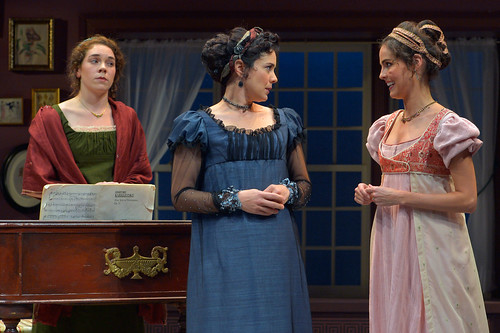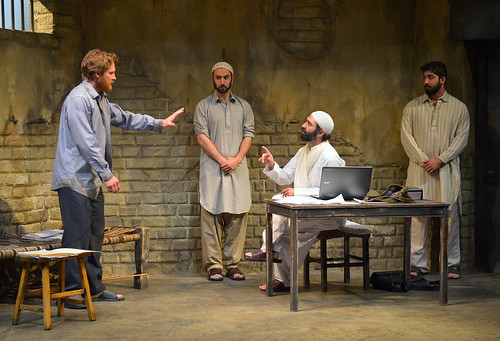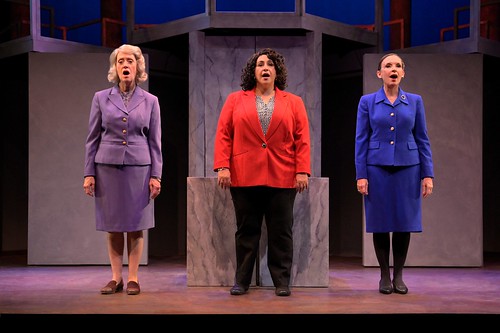
ABOVE: The cast of Justice: A New Musical at Marin Theatre Company includes (from left) Karen Murphy as Sandra Day O’Connor, Stephanie Prentice as Sonia Sotomayor and Lynda DiVito as Ruth Bader Ginsburg. BELOW: DiVito as Ruth Bader Ginsburg. Photos by Kevin Berne
We are told in Marin Theatre Company’s Justice: A New Musical, now continuing its world premiere (after its debut at Arizona Theatre Company), that power should be shared. But to share it, you must first have it.
And power, at Tuesday’s opening night performance, was a tricky proposition. With cold winds howling through Mill Valley (and much of the Bay Area), the lights in the theater flickered a bit just as the audience was being welcomed to the show. And then the emergency lights clicked on. The power was out just long enough for the tech crew to have re-set the whole shebang and run through a full battery of tests. Then, once the show began, the same thing happened. Power out, emergency lights on, intrepid actors halted mid-song. The outage was short lived, but someone announced that the show would not go on and they’d be happy to re-ticket us in the lobby. But wait! The show WILL go on! Book writer Lauren Gunderson and composers Kait Kerrigan (lyrics) and Bree Lowdermilk (music) jumped up on the stage to discuss how they came to write a musical about the first three women on the Supreme Court bench.
There’s nothing like live theater and the enthusiasm with which theater folk carry on the “show must go on” tradition. Even with the winter winds still blowing, the show resumed where it had left off and carried on to its semi-hopeful, semi-terrifying conclusion about the state of the court moving forward.
The notion of a musical about Sandra Day O’Connor, Ruth Bader Ginsurg and Sonia Sotomayor doesn’t exactly seem like a natural fit – it somehow feels too light or too silly to do justice (ahem) to the gravity of what these women have accomplished (and in Sotomayor’s case, are still accomplishing). So give full credit to Gunderson, Kerrigan and Lowdermilk as they quickly establish that the show will be respectful, emotional and enjoyable without being (too) preachy.
To say that Justice is like a feature-length “Schoolhouse Rock” is not a diss. The show is less about the workings of the Supreme Court and more about how O’Connor, the first woman in the court, and then Ginsburg, forged an unlikely friendship (Repbulican-Democrat, Episcopalian-Jew, Texan/Arizonan-Brooklyn Baby) and paved the way for Sotomayor and others (Ketanji Brown Jackson is named; I can’t recall if Elena Kagan is name dropped; and the other one is definitely not mentioned by name).
At only 90 minutes, Justice covers a lot of ground, from 1981 when O’Connor took her seat, to present day, and we see a lot of the American dream/nightmare cross the stage. While the world is turning, we also come to know the O’Connor, Ginsburg and Sotomayor a bit – their personal lives, their quirks, their judicial passions. What makes it all work is not necessarily Gunderson’s vivacious book or Lowdermilk and Kerrigan’s pleasant if not always distinct songs. It’s the powerful women playing these powerful women.
The voices, the dignity, the humanity – it’s all on full display in the strong, beautiful performances by Karen Murphy as O’Connor, Lynda DiVito as Ginsburg and Stephanie Prentice as Sotomayor. I would say that DiVito has the toughest job to do if only because Ginsburg is such an icon (which is, in fact, addressed in one of the songs), but she brings the requisite intelligence, wit and charisma to make a singing Ginsburg (who did, after all, love opera and Barbra Streisand) entirely plausible.
My issue with director Ashley Rodbro’s production is that it doesn’t support its superb actors nearly enough. The cumbersome, unattractive set – think a high school production of Sweeney Todd set in a marbled bathroom – just gets in the way and makes unnecessary work for the actors. At one point Rodbro has actors spinning parts of the set during a song, and it’s beyond distracting. There are hints of projections, but they’re ineffectual and unnecessary (there are actual stars and stripes projected at various times as if we need reminding we’re in America).
And the music. Ugh. From what I can tell in the scant program, there are two keyboard players, and that explains why the faux-symphonic accompaniment sounds so dead. When it’s just piano-like keyboard, we’re fine. The actors are so good they don’t need bells and whistles. They’re brining the power and emotion, and the lackluster accompaniment too often tries to stifle them.
The production simply does not rise to the level of the performers, and that’s a shame. We learn a lot about these women and the often sorry state of our union over the course of Justice, and it’s actually interesting to see these justices bond through song. Had the power actually gone out at the theater, I suspect that if the three actors simply sang and performed the show on their own without the ineffective staging, we’d have been taken right to the heart of this piece and been stirred deeply by these women’s stories, the extraordinary work that has been done and the seemingly impossible work yet to do.
FOR MORE INFORMATION
Justice: A New Musical by Lauren M. Gunderson, Bree Lowdermilk and Kait Kerrigan continues through March 12 at Marin Theatre Company, 397 Miller Ave., Mill Valley. Running time is 90 minutes (no intermission). Tickets are $25-$65. Call 415-388-5208 or visit marintheatre.org.



